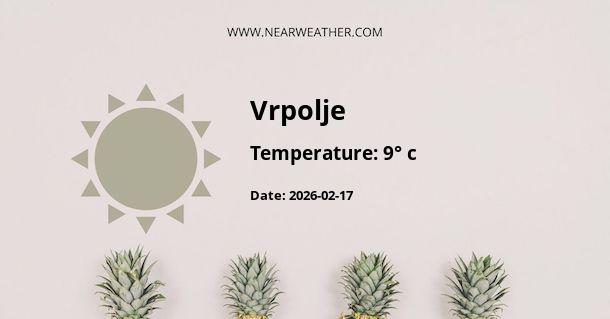Climate and Weather of Vrpolje, Croatia: A Comprehensive Guide
Vrpolje, situated in Croatia, experiences a climate that is characterized by its continental influence, providing distinct seasonal changes through the year. Understanding the weather patterns in Vrpolje can benefit travelers, residents, and enthusiasts who are interested in the meteorological conditions of this area. In our comprehensive guide, we delve into the specifics of Vrpolje's climate, highlighting temperature variations, precipitation levels, and other relevant atmospheric phenomena.
Seasonal Weather Overview
Croatia's geographical location in Central and Southeast Europe grants it a mix of climates, but Vrpolje, specifically, has a predominantly humid continental climate. This section offers insights into the seasonal weather transitions in Vrpolje, emphasizing the temperature and precipitation levels inherent to each season.
Spring
During spring, Vrpolje undergoes a gradual warming trend. The temperatures start to rise, lending to the melting of any residual winter frost and an awakening of the local flora. With the increase in temperatures, there's also an uptick in precipitation.
Summer
Summertime in Vrpolje brings warm and generally humid conditions. The temperatures can rise significantly, occasionally leading to heatwaves. This season is also known for its occasional thunderstorms, which can bring heavy rainfall in short periods.
Autumn
Autumn sees a distinct cooling from the summer’s peak with a gradual decrease in temperatures. Precipitation becomes more frequent and can often be persistent, as the weather systems from the Atlantic begin to have a more pronounced effect on the region.
Winter
Winters are cold with temperatures often dropping below freezing, especially during the night. Snowfall is not uncommon and can transform the landscape into a picturesque winter scene. Days are shorter and the skies cloudier, with less opportunity for sunlight.
Temperature Patterns
Year-round, Vrpolje's temperatures can vary widely. To give a clearer picture of what to expect, the following table outlines the average high and low temperatures throughout the year.
| Month | Average High (°C) | Average Low (°C) |
|---|---|---|
| January | 3 | -3 |
| February | 6 | -1 |
| March | 11 | 3 |
| April | 16 | 7 |
| May | 21 | 12 |
| June | 24 | 15 |
| July | 27 | 17 |
| August | 27 | 17 |
| September | 23 | 13 |
| October | 17 | 8 |
| November | 10 | 3 |
| December | 4 | -1 |
Precipitation and Humidity
Precipitation in Vrpolje is distributed fairly evenly throughout the year, though with some increase during the warmer months due to convectional rainfall and thunderstorms. The following are typical monthly precipitation amounts.
- January: 40 mm
- February: 35 mm
- March: 50 mm
- April: 60 mm
- May: 75 mm
- June: 100 mm
- July: 80 mm
- August: 80 mm
- September: 70 mm
- October: 85 mm
- November: 80 mm
- December: 55 mm
Extreme Weather Events
While Vrpolje is not particularly known for severe weather, it does experience occasional extreme weather events. The region can see intense thunderstorms during the summer months; flash flooding is also a possibility during these periods of heavy rainfall. Furthermore, winter can bring snowstorms and harsh frost, posing challenges for transportation and agriculture.
Wind Patterns
The wind patterns in Vrpolje are influenced by both local and regional topography. Variations in coastal and continental air pressure systems can lead to breezes that range from gentle to brisk. The region can experience winds such as the 'Bora' – a dry, cold, and often gale-force wind descending from the northeast.
Climate Impact on Local Life and Economy
The climate of Vrpolje impacts various aspects of local life and economy, including agriculture, tourism, and everyday living. Farming schedules align with the seasonal weather, ensuring that crops are sown and harvested at optimal times. Moreover, climate conditions affect the tourist season, as warmer summer months attract visitors looking to explore the natural beauty and cultural heritage of the area.
Long-Term Climate Considerations
Climatologists and environmental experts pay close attention to long-term climate trends in regions like Vrpolje. Global climate change has the potential to alter temperature and precipitation patterns, with implications for sea levels, agriculture, and biodiversity. Studying how Vrpolje adapts to such changes can provide invaluable insights into sustainable living practices.
Conclusion
In summary, Vrpolje's climate is a classic example of a continental climate with seasonally diverse weather patterns. Understanding these patterns is crucial for residents and visitors alike to plan effectively for various activities. With considerations for long-term climate change, Vrpolje exemplifies the delicate balance between human habitation and environmental stewardship.
A - Vrpolje's Latitude is 45.210560 & Longitude is 18.405560.
A - Weather in Vrpolje is 10° today.
A - Climate Conditions in Vrpolje shows broken clouds today.
A - Humidity in Vrpolje is 60% today.
A - Wind speed in Vrpolje is 10.15 km/h, flowing at 57° wind direction. today.
